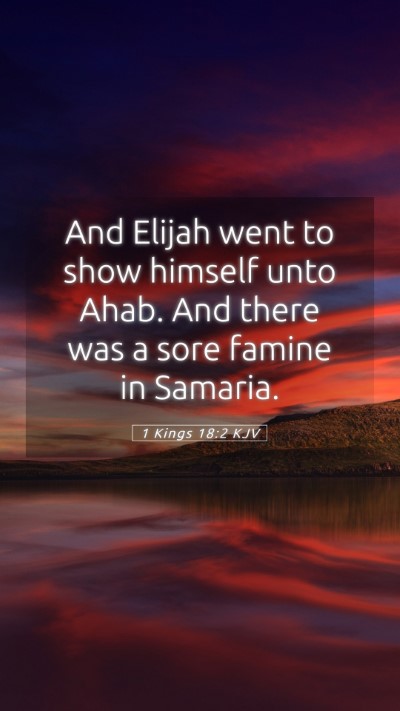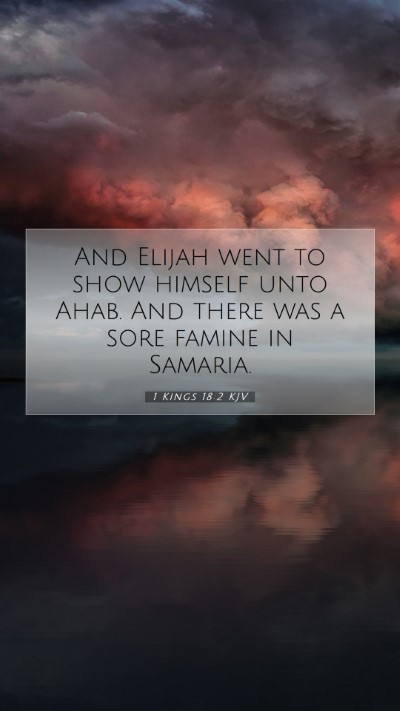Bible Verse Meaning: 1 Kings 18:2
Verse: "So Elijah went to show himself to Ahab. Now the famine was severe in Samaria." (1 Kings 18:2)
Introduction
The context of 1 Kings 18:2 is pivotal in understanding the narrative of Elijah's confrontation with King Ahab and the subsequent challenge to the prophets of Baal. This verse encapsulates a significant turning point in Elisha's ministry and the demonstration of God's sovereignty over Israel's fate amidst a severe drought.
Background Context
This verse emerges during a period of calamity in Israel, characterized by a severe famine that had afflicted the land due to Ahab's idolatrous practices, primarily the worship of Baal—a false god. Elijah's return after years of absence signals God's impending judgment and divine intervention.
Bible Verse Interpretations
- Matthew Henry’s Commentary: Henry emphasizes that Elijah’s return was marked by obedience to God’s command. The severity of the famine serves as a backdrop for God’s impending demonstration of power through Elijah. The famine acts as both judgment and preparation for a return to faith.
- Albert Barnes’ Notes: Barnes highlights the significance of Elijah showing himself to Ahab. It illustrates the prophet demonstrating bravery and obedience to divine direction amidst hostile conditions. The mention of ‘famine’ underscores the seriousness of Israel's spiritual decline and God’s response.
- Adam Clarke’s Commentary: Clarke discusses the contrast between the physical famine and the spiritual famine in Israel. He notes that the encounter represents a critical moment for the nation, as it is a call to repentance and turning back to God for sustenance.
Key Themes in 1 Kings 18:2
- Courage and Obedience: Elijah exemplifies obedience to God, despite potential danger, symbolizing the call for believers to act upon divine guidance.
- Judgment and Mercy: The severe famine highlights both God's judgment on Israel's idolatry and His mercy, providing opportunity for repentance and renewal.
- God's Sovereignty: The narrative illustrates God’s control over nature and kingdoms, showcasing His ultimate authority over Israel and its leaders.
Understanding Scripture: Application
This verse challenges readers to consider their own faithfulness in times of trouble. Just as Elijah was called to confront the powers of his day, modern believers are encouraged to act boldly in their faith, relying on God's strength against societal challenges. The occurrence of famine serves as a metaphor for spiritual barrenness, urging believers to seek God's restoration.
Bible Study Insights
For Bible study groups, this passage serves as a foundation for exploring themes of faith, idolatry, and God's response to human actions. Discussion can center around how God uses prophets today and how to recognize spiritual famine in contemporary contexts.
Cross References
- James 5:17 - Elijah’s prayer and its effects
- 1 Kings 17:1 - Introduction to Elijah's ministry
- 2 Chronicles 18:1 - Ahab’s alliances and their consequences
- 1 Kings 16:30-33 - Ahab's idolatry
Conclusion
In summation, 1 Kings 18:2 encapsulates critical themes of obedience, judgment, and the need for divine guidance in turbulent times. Through understanding this verse, believers can gain insights into their own spiritual journeys and the importance of turning towards God amidst challenges. Biblical exegesis reveals layers of meaning conducive to deeper meditation and application in daily life.
Further Study: Those seeking a deeper understanding of scripture can use various Bible study tools, such as lesson plans and guides focused on the life of Elijah and the historical context of Israel during this era. These resources are essential for anyone aiming to enrich their knowledge of Biblical narratives and their implications for contemporary faith practices.


